Introduction
Solana co-founder Anatoly Yakovenko has announced plans for a new decentralized exchange called Percolator, targeting the competitive perpetual futures market. The announcement comes as rival platform Hyperliquid has been attracting users away from Solana and other major blockchains. Yakovenko has released implementation-ready code for the sharded perpetual exchange protocol on GitHub, signaling Solana’s strategic response to the rapidly evolving DeFi derivatives landscape.
Key Points
- Percolator uses a sharded architecture with independent Slab programs for matching and settlement, while Router programs handle collateral and cross-slab routing
- Hyperliquid recently implemented HIP-3 upgrade allowing users to stake 500,000 HYPE tokens ($18M) to launch their own perpetual markets with custom margin rules
- VanEck report revealed Hyperliquid captured 35% of all blockchain revenue in July, directly competing with Solana, Ethereum and BNB Chain for high-value users
Percolator's Technical Architecture
Anatoly Yakovenko’s newly announced Percolator DEX introduces a sophisticated sharded architecture designed specifically for perpetual futures contracts on the Solana blockchain. The protocol consists of two primary on-chain programs: a Router program and a Slab program. The Router program manages critical functions including collateral handling, portfolio margins, and cross-slab routing, while the Slab program serves as a matching engine overseen by liquidity providers. This dual-program structure represents a significant technical innovation in the decentralized exchange space.
Each Slab program operates independently, enabling what Yakovenko describes as “fully self-contained matching and settlement.” This design keeps each liquidity provider’s slab completely self-contained and innovable, while the Router guarantees atomic routing, portfolio netting, and capability-scoped safety. The GitHub repository already shows completed data structures for order books and memory pools, indicating substantial progress toward implementation. However, the development of the protocol’s liquidation systems remains in progress, representing the final hurdle before launch.
Yakovenko has characterized the project as “implementation-ready” in the GitHub documentation, with developers currently engaged in testing. The technical sophistication of Percolator’s architecture positions it as a potential game-changer in the perpetual futures market, offering a level of modularity and independence that could appeal to sophisticated DeFi traders and liquidity providers seeking more control over their trading environments.
The Hyperliquid Challenge and Market Dynamics
The timing of Percolator’s announcement comes amid significant market shifts, particularly the rapid ascent of Hyperliquid. According to a VanEck report published two months prior to Yakovenko’s announcement, Hyperliquid accounted for 35% of all blockchain revenue in July, with this growth coming directly at the expense of Solana, Ethereum, and BNB Chain. The report specifically noted that “Hyperliquid has poached high-value users from Solana and has retained them by offering users a simple, highly functional product.”
Hyperliquid’s trading volume reached a new monthly high of $319 million in July, indicating a broader trend of cryptocurrency traders migrating from centralized exchanges to decentralized alternatives. The platform recently completed the implementation of permissionless, builder-deployed perpetual contracts through its HIP-3 upgrade. This innovation allows users to stake a minimum of 500,000 HYPE tokens, worth approximately $18 million, to launch their own perpetual markets with independent margin rules.
The competitive pressure from Hyperliquid represents a significant challenge for Solana’s ecosystem. The VanEck findings highlight how quickly market dynamics can shift in the DeFi space, with platforms like Hyperliquid and Astar demonstrating that user loyalty is increasingly tied to functionality and user experience rather than blockchain allegiance. This context makes Percolator’s development particularly strategic for Solana’s positioning in the derivatives market.
Strategic Implications and Future Outlook
Percolator represents Solana’s direct response to the growing competition in the derivatives-focused DEX space. While the Solana Foundation has not confirmed whether Percolator will receive official ecosystem support or remain community-driven, the protocol’s development signals a recognition that native financial primitives are crucial for maintaining and expanding Solana’s DeFi ecosystem. The project joins an increasingly crowded field where technical innovation and user experience are becoming key differentiators.
The current state of Percolator’s development suggests an imminent launch once the protocol’s liquidation and governance protocols are finalized. Developers engaged with the GitHub repository have indicated that the project is “deep in testing,” pointing to advanced stages of development. This positions Percolator to potentially capture market share from established players while offering Solana-native solutions for perpetual futures trading.
The broader implications extend beyond just Solana versus Hyperliquid competition. The emergence of sophisticated DEX protocols like Percolator reflects the maturation of decentralized finance, where complex financial instruments are becoming increasingly accessible through blockchain technology. As platforms like Hyperliquid continue to innovate with features like permissionless perpetual contract deployment, and Solana responds with architectural innovations like Percolator’s sharded design, the entire DeFi ecosystem stands to benefit from this competitive dynamic driving technical advancement and improved user experiences.
📎 Source reference: co.uk

